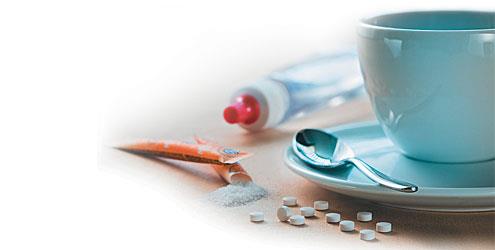
Sweeteners are bad to your health?
The answer is not totally linear: it depends. Everything depends on the type of sweetener and the amount consumed.
There are people who are sensitive to artificial sweeteners, such as aspartame, and can reveal gastrointestinal symptoms, such as bloating, gas and changes of the intestinal transit, for its laxative properties, common to several artificial sweeteners.
The sweeteners are divided into natural and artificial:
The answer is not totally linear: it depends. Everything depends on the type of sweetener and the amount consumed.
There are people who are sensitive to artificial sweeteners, such as aspartame, and can reveal gastrointestinal symptoms, such as bloating, gas and changes of the intestinal transit, for its laxative properties, common to several artificial sweeteners.
The sweeteners are divided into natural and artificial:
- The natural ones are those that nature presents, as an alternative to sugar from the cane and refined, such as honey, molasses, stevia or sweetleaf, agave nectar and maple syrup. Some defend that xylitol is also considered a natural sweetener.
- The artificial sweeteners used in food industry and to sweeten drinks like coffee, are aspartame, fructose, xylitol, acesulfame-K (or acesulfame potassium) and sodium cyclamate (E952 food additive). Sucrose was the first artificial sweetener to appear, and many still remember the little old “hermesetas”, that have a characteristically bitter finish. Their negative properties are not proven.
Sodium cyclamate, for example, should be eaten very carefully by people who have high blood pressure, due to the presence of sodium.
Xylitol, despite being considered safe and not requiring insulin to be metabolized, has dangerous effects for pets and should not be left near dogs, who suffer hypoglycemia and intoxication after ingestion. This compound is used in many sugar-free foods, like candies, chewing gum and other sweets. The effect of xylitol in dogs can be observed just after 30 minutes of ingestion and causes vomiting, weakness, lack of coordination and depression.
Aspartame is perhaps the most controversial sweetener and there are reports that the over-consumption carries an increased risk of developing certain diseases, but for that to happen the consumption has to be extremely high. However, allegations that aspartame causes health problems really are not proven and there are rumors of a "conspiracy theory" against this sweetener, approved by Government health agencies from various countries.
Fructose began to be used by diabetics, because it was discovered that it did not need insulin to be metabolized, and diabetics do not produce insulin. However, once more, there is no consensus and there are doctors who argue that the uncontrolled use of sweeteners can result in the production of glucose by the body and therefore an increase in blood sugar.
It is more desirable to opt for natural sweeteners instead of artificial. But the ideal thing is to educate your palate without the addition of sugars and sweeteners. Start by making drinks more diluted (weak) and with no added sugar or sweeteners, be it coffee, tea, tisanes or juices.
Your palate will become used to the absence of sugar and you will soon be able to drink your coffee, tea or orange juice unsweetened.